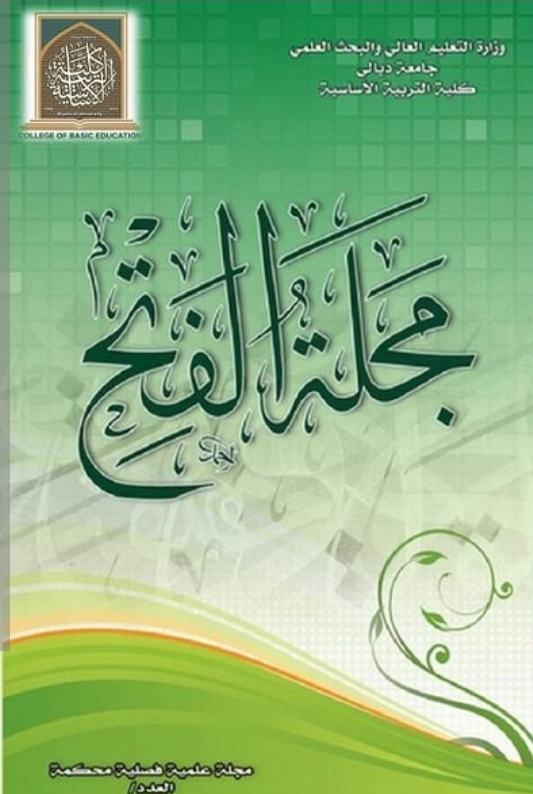The strategies of the Systems Intelligence, Metacognition Thinking among Saudi universities students
DOI:
https://doi.org/10.23813/FA/23/1/5Keywords:
Systems IntelligenceAbstract
The present study aimed to identify the levels of Systems Intelligence, Metacognition Thinking and the relationship between them in the light of specialization, gender, and location. To achieve the goals of current study the researcher constructed both scales of Systems Intelligence and Metacognition Thinking. The sample consisted of (900) male and female students from Umm AL-Qura, King Abdulaziz, and Ataif universities in Arabic and chemistry specialization. The researcher used descriptive approach correlative. The study found that the Systems Intelligence and Metacognition Thinking were average level. There were no significant differences between them, due to specialization, gender, and graphic location. Also, there is a positive significant correlation between them. Which can be predicted through Systems Intelligence. The researcher recommended organizing training courses and workshops to develop the Systems Intelligence and Metacognition Thinking for Saudi students' universities.
References
المراجع:
ا. المراجع العربية
أبوحطب، فؤاد عبداللطيف، ومختار، آمال أحمد (1996). علم النفس التربوي (ط6). القاهرة: مكتبة الأنجلو المصرية.
أبو لطيفة، لؤي حسن محمد ( 2015). مستوى التفكير ما وراء المعرفي لدى طلبة كلية التربية في جامعة الباحة بالمملكة العربية السعودية. مجلة جامعة القدس المفتوحة للأبحاث والدراسات التربوية والنفسية ، 3(10)، 82-109.
آندرسون، جون (2007). علم النفس المعرفي وتطبيقاته (ترجمة: محمد سليط و رضا الجمال). الأردن، عمان: دار الفكر للنشر والتوزيع.
الثقفي، زاهر حسين (2013). تقنين اختبار الذكاء المنظومي لروثمان على طلاب التربية الخاصة بجامعة أم القرى (رسالة ماجستير غير منشورة). كلية التربية، جامعة أم القرى بمكة المكرمة.
الجراح ، عبدالناصر ، عبيدات، علاء الدين (2011). مستوى التفكير ما وراء المعرفي لدى عينة من طلبة جامعة في ضوء بعض المتغيرات. المجلة الأردنية في العلوم التربوية، 7(2)، 145-162.
حمودة, الاء (2015). أنماط السيطرة الدماغية وعلاقتها بالتفكير ما وراء المعرفي لدى طلبة جامعة الازهر (رسالة ماجستير غير منشورة). كلية التربية، جامعة الأزهر, فلسطين.
الحموري، فراس، و أبو مخ، أحمد (2011). مستوى الحاجة إلى المعرفة والتفكير ما وراء المعرفي لدى طلبة البكالوريوس في جامعة اليرموك، مجلة جامعة النجاح للأبحاث، 25(6)، 1436-1488.
ذياب، محمد (2015). الذكاء المنظومي وأثره على الإنجاز الأكاديمي في ضوء نظرية العبء المعرفي لدى طلاب الجامعة. بحث مقدم في مؤتمر التربية 2015 في دولة قطر. مسترجع: doi: 10.5339/qproc.2015.coe.34
رشدي، منصور. فام. (1997). حجم التأثير: الوجه المكمل للدلالة الإحصائية. المجلة المصرية للدراسات النفسية، 7 (16)، 57-75.
رشيد، أزهار (2013). مستوى التفكير ما وراء المعرفي لطلبة جامعة بغداد. مجلة البحوث التربوية والنفسية, 13, 188- 218.
ساسي، عقيل، وقريشي, عبدالكريم (2013). طبيعة العلاقة بين التفكير ما وراء المعرفي في الرياضيات والذكاء العام لدى تلاميذ الثالثة متوسط دراسة ميدانية بمدينة ورقلة. مجلة العلوم الإنسانية والاجتماعية, 12, 1-11.
الشربيني، فوزي والطنطاوي، عفت ( 2006 ). إستراتجيات ما وراء المعرفة بين النظرية والتطبيق. مصر، المنصورة: المكتبة العصرية للنشر والتوزيع.
عبداللطيف، محمد (2011). منظور الذكاء المنظومي للقيادة التعليمية ووعي المعلمين به في أدائها. المجلة المصرية للدراسات النفسية، 21(72)، 315-367.
عبيد, إدوارد. شحادة. (2004). أثر إستراتيجتي التفكير الاستقرائي والتفكير الحر في التفكير الناقد و الإدراك فوق المعرفي والتحصيل لدى طلبة المرحلة الأساسية في مادة الأحياء (أطروحة دكتوراه غير منشورة). جامعة عمان العربية, الأردن.
الفيل، حلمي (2013). تصميم مقرر إلكتروني في علم النفس قائم على مبادئ نظرية المرونة المعرفية وتأثيره في تنمية الذكاء المنظومي وخفض العبء المعرفي لدى طلاب كلية التربية النوعية جامعة الأسكندرية ( رسالة دكتوراه غير منشورة). كلية التربية ، جامعة الأسكندرية.
الفيل، حلمي ( 2015). مقياس الذكاء المنظومي للراشدين. القاهرة: مكتبة الأنجلو المصرية.
ب. المراجع الاجنبية
Abdelwahab, K. (2010). Systemic Intelligence and Brain Functions. Egyption Journal for Psychological Studies, 20(69), 483-500.
Cohen, J. (1988). Statistical Power Analysis for the Behavioral Sciences (2nd ed.). Hillsdale, NJ: Lawrence Erlbaum.
Guss, C., & Wiley, B. (2007). Metacognition of Problem Solving Strategies in Brazil, India, and the United States. Journal of Cognition and Culture, 7, 1 – 25.
Hamalainen, R. & Saarinen, E. (2007). Systems Intelligence Connecting Engineering Thinking With Human Sensitivity. In R. Hamalainen& E. Saarinen (Eds). Systems Intelligence in Leadership and Everyday Life (Pp 51-78). Helsinki University of Technology, Systems Analysis Laboratory Research report.
Hojat, M. & Xu, G. (2004). A Visitor's Guide to Effect Sizes: Statistical Significance Versus Practical "Clinical" Importance of Research Findings. Advances in Health Sciences Education. 9(3), 241-249.
Ranne, R. (2007). Manifestations of the Implicitness of Systems Intelligence In Leadership. Mat-2. 108 Independent Research Project in Applied Mathematics. Helsinki University of Technology. Pp 1-30.
Rauthmann, J. (2010). Psychological Aspects of Systems Intelligence: Conceptualisations of a New Intelligence From. In R. Hamalainen, E. Saarinen (Eds). Essays on Systems Intelligence (Pp29-60). Analysis Laboratory. Espoo, Finland.
Schraw, G & Dennison, R. (1994). Assessing metacognitive awareness. Cotemporary educational psychology, 19 (4), 460 – 475
Volker, M. (2006). Reporting Effect Size Estimates in School Psychology Research. Psychology in the Schools. 43(6), 653-672.
Zachary, W. (2000). Incorporating Metacognitive Capabilities in Synthetic Cognition. Proceedings of the Ninth Conference on Computer Generated Forces and Behavioral Representation, P. 512- 513. Retrieved Jan 17, 2009, from: http://www.downloads.chiinc.com/PDFs/INCmetac ap.
Downloads
Published
How to Cite
Issue
Section
License
Copyright (c) 2023 https://creativecommons.org/licenses/by/4.0/

This work is licensed under a Creative Commons Attribution 4.0 International License.
حقوق النشر والترخيص
تطبق مجلة الفتح للبحوث التربوية والنفسية ترخيص CC BY (ترخيص Creative Commons Attribution 4.0 International). يسمح هذا الترخيص للمؤلفين بالاحتفاظ بملكية حقوق الطبع والنشر لأوراقهم. لكن هذا الترخيص يسمح لأي مستخدم بتنزيل المقالة وطباعتها واستخراجها وإعادة استخدامها وأرشفتها وتوزيعها ، طالما تم منح الائتمان المناسب للمؤلفين ومصدر العمل. يضمن الترخيص أن المقالة ستكون متاحة على نطاق واسع بقدر الإمكان وأن المقالة يمكن تضمينها في أي أرشيف علمي.
لمزيد من المعلومات، يرجى متابعة الرابط: https://creativecommons.org/licenses/by/4.0/.



